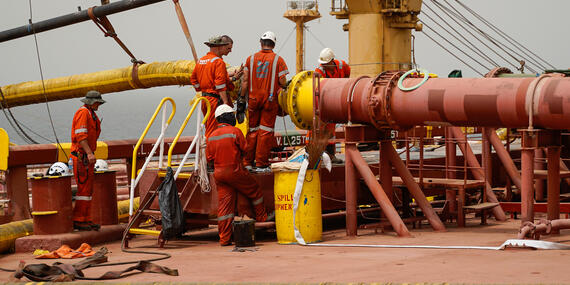Yemen: UN completes removal of oil from decaying tanker in Red Sea

More than 1.1 million barrels of oil transferred from FSO Safer to the replacement tanker over 18 days
Today, the UN successfully completed the transfer of oil from the FSO Safer supertanker off Yemen’s Red Sea coast, preventing the immediate threat of a massive spill.
The FSO Safer has been at risk of breaking up or exploding for years. A major spill from the vessel would have resulted in an environmental and humanitarian catastrophe.
The cargo of oil aboard the FSO Safer has been pumped onto the replacement vessel MOST Yemen (formerly Nautica) in a ship-to-ship transfer that began on 25 July, following preparations on site for the operation that began in May by leading marine salvage company SMIT, a subsidiary of Boskalis.
The UN Development Programme, which contracted SMIT, is implementing the operation.
As much of the 1.14 million barrels has been extracted as possible. However, less than 2 per cent of the original oil cargo remains mixed in with sediment that will be removed during the final cleaning of the FSO Safer.
UN Secretary-General António Guterres said: “I welcome the news that the transfer of oil from the FSO Safer has been safely concluded today. The United Nations-led operation has prevented what could have been an environmental and humanitarian catastrophe on a colossal scale.”
The UN Resident and Humanitarian Coordinator for Yemen, David Gressly, who has led UN system-wide efforts on the [FSO] Safer since September 2021, said: “Today is a great milestone. A remarkable global coalition came together under the UN umbrella to prevent the worst-case scenario of a catastrophic oil spill in the Red Sea. We need to finish the work the UN started. The installation of a CALM [Catenary Anchor Leg Mooring] buoy [that will keep the tanker moored] to which the replacement vessel will be safely tethered is the next crucial step.”
Farhan Haq, Deputy Spokesperson for the Secretary-General pointed out, “Additional funding will be needed to finish the project and remove any remaining environmental threat to the Red Sea.”
The Secretary-General has thanked the many countries, corporate and philanthropic donors as well as ordinary citizens who contributed funding for the project.
Mr. Guterres has also urged donors to contribute funds at this crucial time to conclude this operation.
